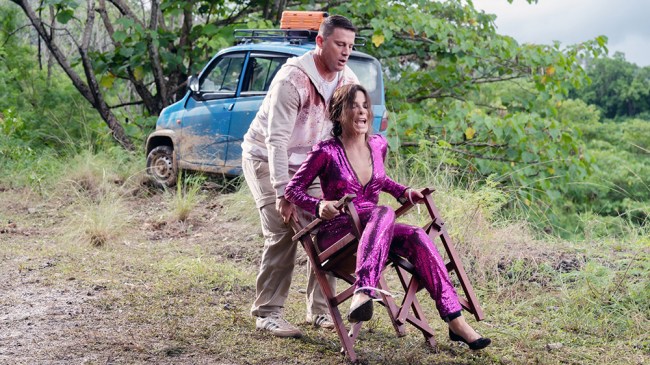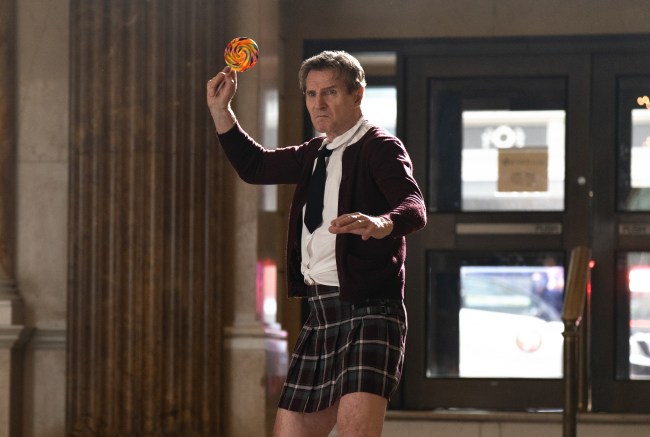If your definition of a comedy is “Barbie,” “Deadpool vs. Wolverine,” or “A Minecraft Movie,” the studio comedy is doing brilliantly. But if you’re thinking Gen Z doesn’t have its own “Bridesmaids,” “The Hangover,” or “Anchorman,” you’re not alone in wondering what happened to this genre?
Is this a joke? Perhaps not a funny one.
At the start of July, IndieWire’s chief film critic David Ehrlich declared “The Naked Gun” the most important movie of the summer. That’s because it’s a no-doubt-about-it studio comedy and spoof film. It’s not comedy packaged with superheroes or toy and video game sales, and though it’s a continuation of a popular series, it doesn’t feel like a sequel cash grab. Movies like it are becoming rarer, especially at the box office. And when you have a lack of diverse options in theaters, fewer people start showing up. Theaters need movies that are monumentally dumb on purpose like “The Naked Gun” as much as they need the mega blockbusters that are monumentally dumb on accident.
So did Liam Neeson and director Akiva Schaffer save America? “The Naked Gun” has just surpassed $100 million worldwide, but only about half of that came from domestic dollars. That’s a respectable number that should likely turn a profit for the studio, but it’s not a mega culture-defining hit that would singlehandedly bring studio comedies off streamers and into theaters (I predict now that “The Naked Gun” will do gangbusters once it hits PVOD or Paramount+). It may also be the most successful “traditional studio comedy” in years.
In the five years before the COVID-19 pandemic, at least six different sure-fire studio comedies surpassed $100 million at the domestic box office. That’s when you filter out the animated movies, sequels, the family comedies, and some of the sequels like “Pitch Perfect” that might be better defined as musicals.
But that half-decade produced hits like “Trainwreck,” “Girls Trip,” “Bad Moms,” “Daddy’s Home” and its sequel, and “Spy.” None of those can be confused with anything other than a studio comedy in the truest sense. If we’re being generous to the comedy definition, “Central Intelligence,” “Sausage Party,” and “Crazy Rich Asians” all help the case that people once came to the theater to laugh.
 ‘The Lost City’©Paramount/Courtesy Everett Col
‘The Lost City’©Paramount/Courtesy Everett Col
Post-COVID, the most successful original comedy of the last five years is the adventure/romance/comedy “The Lost City” with Sandra Bullock and Channing Tatum. It’s the only bona fide comedy to surpass $100 million domestic. The next biggest hits, including “Anyone but You,” “The Naked Gun,” “Ticket to Paradise,” “Cocaine Bear,” “No Hard Feelings,” and “One of Them Days,” were all in the $50-90 million range domestic (according to data via Comscore).
“There’s a real drop-off in performance of comedies that were well-reviewed and well-received by audiences,” one studio distribution chief told IndieWire. “So you’ve got to start with, OK, what happened? How did this genre go away?”
The distro chief said that, while comedies started declining before COVID, the pandemic really accelerated things. The first culprit is the amount of “free comedy” available on streaming. Netflix, Hulu, and HBO Max are loaded with stand-up comedy specials that don’t require the same barrier to entry as the act of driving to a theater and buying a ticket.
When we raised the point to other distribution chiefs that studio comedy films have all moved to streaming, they challenged with “which ones?” “Happy Gilmore 2” is a great example of a comedy that has broken through on streaming and could have been a box office hit had it gotten the chance, though it may be the only good example.
But streamers are also littered with B-comedies that, in another era, might have done modest but forgettable business in theaters. We’re looking at you, “The Pickup,” “Heads of State,” “Back in Action,” “Kinda Pregnant,” and “Summer of 69,” all of which were released this year. Those movies are reserved for streaming these days, likely for good reason.
Another distribution chief argued that the so-called “four-quadrant studio comedy” just doesn’t work anymore. Today’s audiences don’t want just Owen Wilson and Vince Vaughn paired up, they want genre films with more nuance or niche comedies like “Friendship” that can find a very targeted and passionate audience.
 ‘Happy Gilmore 2’Scott Yamano/Netflix
‘Happy Gilmore 2’Scott Yamano/Netflix
But certain studios seem to be staying away entirely. Sony and Paramount have a few of those aforementioned hits, but Warner Bros., Disney, and Universal have been moving away from the genre and toward more IP. Studios are also staying away from a title like “Happy Gilmore 2” because of its budget. The first distribution chief speculates the Adam Sandler sequel likely cost Netflix a fortune of between $120-150 million to accommodate all the cameos, back-end deals, and special effect-driven gags.
With the box office as depressed as it is, would that movie still be seen as a hit in theaters?
“If your budgets are reasonable, you can afford to hit singles and doubles. That’s a good business. But what you can’t do with a challenge genre like comedies is swing for the fences,” the first distributor said. “I wouldn’t want to have that risk. If you make that movie for $75 million, maybe I’d take that risk.”
One idea floated by that distributor is to simply lengthen theatrical windows. It’s the same challenge for other tentpole movies, but for comedies, the gap between theaters to streaming can be exceptionally short, and audiences are just fine waiting for them. Another potential solution: don’t charge for “The Naked Gun” as much as it costs to see “Jurassic World.” That, however, would require a big shift in how exhibitors do business.
But if there’s something that gave the distributors we spoke to hope, it’s that the best comedies have phenomenal word of mouth. Look at movies like “The Hangover” or “Bridesmaids,” movies that did not open huge in their first weekend, but then saw domestic total multiples of at least six times what they first opened to. These movies were slow burn hits that people had to talk about and see, and those movies stayed successful in theaters for weeks on end.
 Sydney Sweeney and Glen Powell in ‘Anyone but You’Courtesy of Sony
Sydney Sweeney and Glen Powell in ‘Anyone but You’Courtesy of Sony
For as hilarious as “The Naked Gun” is, it did only a respectable multiple of just over 3, as did movies like “No Hard Feelings” and “Freakier Friday.” But the poster-child of a late-blooming success story in the post-COVID era is “Anyone but You,” which has a staggering 14.72 multiple after opening to just $6 million and looking like a flop. Stars Sydney Sweeney and Glen Powell famously manufactured a phony real-life romance — all while Sweeney was still engaged — that got internet sleuths buzzing and bolstered audience interest to see what chemistry might be on screen.
Another studio distribution chief said that, while comedy hasn’t quite recovered from the pandemic or strikes, it’s heating up. What’s more, this is a “copycat business,” and the moment the next studio comedy hits it big, everyone else in town will have three similar ones in the pipeline.
“A movie can still open to $6 [million] and do $90 [million],” the executive said. “That to me, there’s a lot of hope, because if the movie is funny, you can have a 15 multiple. If it delivers, the numbers are there, there absolutely can be another ‘Hangover.”


